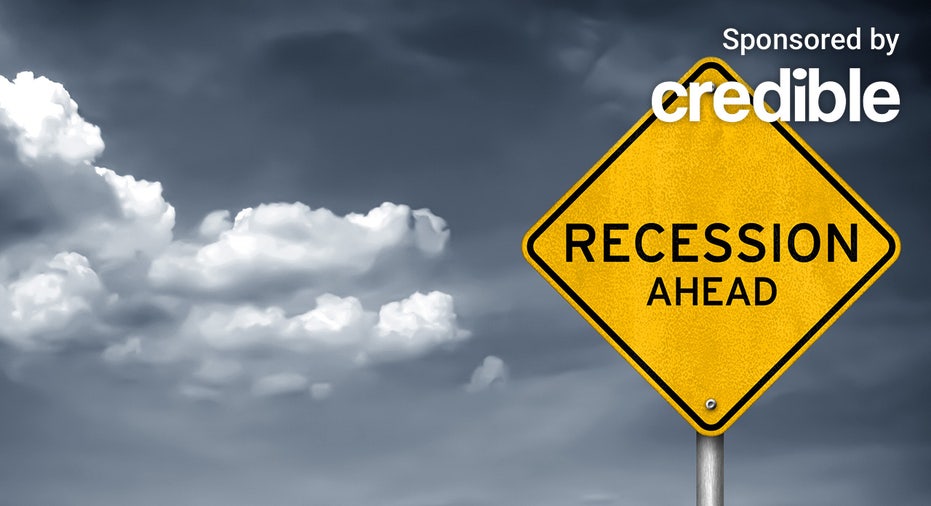GDP contraction sparks recession debate: What consumers can do now
Here’s what that means for interest rates

GDP contracted yet again in the second quarter of 2022, meaning the U.S. may be in a recession. (iStock)
Gross domestic product (GDP) decreased in the second quarter of this year, marking the second consecutive GDP contraction – the common definition of a recession.
Real GDP contracted 0.9% annually in the second quarter, which is better than its contraction of 1.6% annually in the first quarter, the Bureau of Economic Analysis (BEA) reported Thursday. This comes as high inflation forced consumers and businesses to cut back on spending.
The contraction was primarily driven by decreases in private inventory investment, residential fixed investment, federal government spending, state and local government spending, and nonresidential fixed investment.
If you are struggling with inflation, using a personal loan can help you pay down debt and reduce your monthly expenses. Visit Credible to find your personalized interest rate without affecting your credit score.
FANNIE MAE REVISES GDP FORECAST FOR 2022, 2023 AMID HIGH INFLATION
White House says Q2 GDP does not indicate recession
Late last week, ahead of this second quarter GDP reading, the White House Council of Economic Advisors said that even if the GDP report is negative, it's "unlikely" to indicate a recession. Typically, economists consider a recession to be after two consecutive quarters of negative GDP growth. But the White House said that may not be the case.
"What is a recession? While some maintain that two consecutive quarters of falling real GDP constitute a recession, that is neither the official definition nor the way economists evaluate the state of the business cycle," the White House economic advisors said in a blog post.
The National Bureau of Economic Research defines a recession as "a significant decline in economic activity that is spread across the economy and that lasts more than a few months." The bureau will typically wait as long as a year to declare that a recession has begun.
"Based on these data, it is unlikely that the decline in GDP in the first quarter of this year – even if followed by another GDP decline in the second quarter – indicates a recession," the White House’s post stated.
Following the GDP reading, the White House issued a reaction from President Joe Biden.
"Coming off of last year’s historic economic growth – and regaining all the private sector jobs lost during the pandemic crisis – it’s no surprise that the economy is slowing down as the Federal Reserve acts to bring down inflation," Biden said in the statement. "But even as we face historic global challenges, we are on the right path and we will come through this transition stronger and more secure."
In a recent NBC interview, Treasury Secretary Janet Yellen also said the U.S. is not in a recession, but rather, a period of transition.
"This is not an economy that's in recession, but we're in a period of transition in which growth is slowing," Yellen said. "And that's necessary and appropriate, and we need to be growing at a steady and sustainable pace. So, there is a slowdown, and businesses can see that and that's appropriate, given that people now have jobs, and we have a strong labor market."
If you are struggling in today’s economy, you could consider refinancing your home loan to lower your monthly mortgage payment. Visit Credible to compare multiple mortgage lenders at once and choose the one with the best interest rate for you.
INFLATION HITS NEW 40-YEAR HIGH IN JUNE — WHAT THIS MEANS FOR INTEREST RATES
What does this mean for interest rates?
Although the economy entered into a technical recession, the Federal Reserve is still likely to continue raising interest rates to combat rising inflation.
At its most recent meeting, the Fed increased interest rates by 75 basis points. This marked the fourth time this year that the central bank raised rates, bringing the target range for the federal funds rate to 2.25% to 2.5%.
"The economy slowed significantly, though unevenly, in the first half of 2022 on the expectation that the Fed will aggressively raise interest rates," Doug Duncan, Fannie Mae's senior vice president and chief economist, said in the company's recent forecast. "With inflation running well above the target rate, the market’s expectation that further, substantial monetary tightening is needed has driven interest rates even higher."
If you are struggling financially amid rising inflation, you could consider refinancing your student loans to lower your monthly payments. To see if this is the right option for you, contact Credible to speak to a student loan expert and get all of your questions answered.
Have a finance-related question, but don't know who to ask? Email The Credible Money Expert at moneyexpert@credible.com and your question might be answered by Credible in our Money Expert column.




















